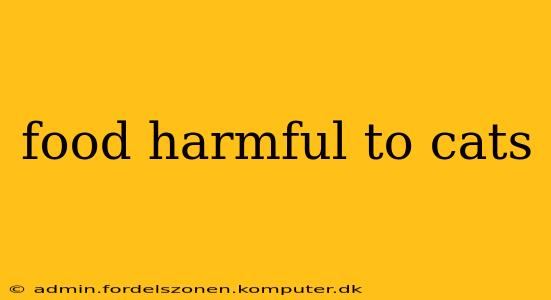Cats, with their independent and often enigmatic nature, require careful attention to their dietary needs. While a balanced commercial cat food provides most essential nutrients, many human foods are toxic or simply unhealthy for our feline friends. Understanding which foods to avoid is crucial for ensuring your cat's health and longevity. This guide will explore common foods harmful to cats, explaining the risks and offering safer alternatives.
What Human Foods Are Toxic to Cats?
Many common household foods pose significant dangers to cats. Ingesting even small amounts can lead to serious health problems, sometimes even death. Here are some of the most dangerous culprits:
-
Chocolate: Containing theobromine and caffeine, chocolate is highly toxic to cats. These compounds can cause vomiting, diarrhea, restlessness, hyperactivity, elevated heart rate, tremors, and even seizures. Dark chocolate is particularly dangerous due to its higher concentration of theobromine.
-
Onions and Garlic: These members of the Allium family contain compounds that damage red blood cells, leading to anemia. Even small amounts, whether raw, cooked, or powdered, can cause significant harm. Symptoms can include weakness, lethargy, and pale gums.
-
Grapes and Raisins: While the exact toxic substance is unknown, grapes and raisins can cause acute kidney failure in cats. Even a small amount can trigger this life-threatening condition. Symptoms include vomiting, diarrhea, and lethargy.
-
Alcohol: Similar to humans, alcohol is highly toxic to cats. Even small amounts can cause liver damage, respiratory depression, and even death.
-
Xylitol: This artificial sweetener, found in many sugar-free products like gum, candy, and baked goods, is extremely toxic to cats. It can cause a rapid drop in blood sugar, leading to liver failure.
-
Avocado: Avocados contain persin, a toxin that can cause vomiting and diarrhea in cats.
-
Raw Meat and Fish: Raw meat and fish can contain bacteria like Salmonella and E. coli, which can cause serious illness. Furthermore, raw fish can contain thiaminase, an enzyme that destroys thiamine (vitamin B1), leading to neurological problems.
-
Milk and Dairy Products: Many cats are lactose intolerant. Consuming milk or dairy products can cause digestive upset, including vomiting and diarrhea.
-
Yeast Dough: Rising yeast dough can produce ethanol, which is toxic to cats, and can also expand in the stomach, causing pain and potentially rupturing the stomach.
What About Other Foods? Are There Any Others I Should Avoid?
While the foods listed above are particularly dangerous, other foods should be given to cats only in moderation or avoided altogether. These include:
-
Coffee and Tea: Contain caffeine, which is toxic to cats.
-
Macadamia Nuts: Can cause weakness, tremors, and hyperthermia.
-
Raw Eggs: Can contain harmful bacteria like Salmonella.
-
Bones (Cooked or Raw): Can splinter and cause internal injuries.
-
Large amounts of salt or fat: Can upset your cat's stomach and contribute to health problems.
My Cat Ate Something Toxic, What Should I Do?
If you suspect your cat has ingested a toxic substance, contact your veterinarian or an animal poison control center immediately. Time is of the essence in these situations. Be prepared to provide information about the substance ingested, the amount, and when it occurred. Do not induce vomiting unless specifically instructed by a veterinarian.
Can I Give My Cat Human Food?
While some small amounts of certain human foods might seem harmless, it’s generally best to avoid giving your cat anything other than cat food formulated to meet their nutritional needs. A balanced diet tailored for cats is crucial for their health and well-being.
What are Safe Alternatives to Toxic Foods?
Always consult your veterinarian for dietary recommendations for your individual cat. However, generally speaking, stick to high-quality cat food. If you want to occasionally give your cat a treat, consider safe options like small pieces of cooked chicken (no bones) or a tiny amount of plain, cooked fish. Remember moderation is key.
This information is for general knowledge and does not replace professional veterinary advice. Always consult with your veterinarian regarding your cat’s diet and any concerns about food safety.
